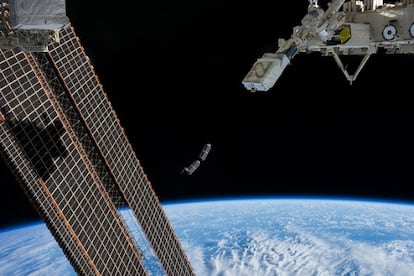Catalonia’s new space program will begin with nanosatellite launch from Kazakhstan
The Spanish region is investing €18 million in a controversial initiative to develop a promising economic sector


A date has been set for the launch of Catalonia’s first nanosatellite.
On March 20, at 7.07am Spanish time, a rocket will lift off from Baikonur, in Kazakhstan, to release the first spacecraft built as part of the New Space strategy developed by the Catalan government, which is expected to pour €18 million into the program over the next four years.
This first launch will improve connectivity in the Spanish northeastern region, while a second nanosatellite due to go into space late this year or in early 2022 will provide images of the Earth and help fight climate change.
In late October the Catalan government announced plans to create its own space agency and develop a new sector that is expected to create 1,200 jobs. The tiny satellites, which are the size of a shoebox, weigh between one and 10 kilograms, and cost a fraction of conventional ones, are packed with technology and have become very popular since 2014.
Some countries have been investing significantly in the new space economy for some years, and Catalonia cannot remain on the sidelines, we need to be pioneers on this issueCatalan chief of digital policy, Jordi Puigneró
But the decision to create a Catalan space program at a time of economic crisis has drawn criticism. At a news conference on Wednesday, the Catalan chief of digital policy, Jordi Puigneró, defended the initiative.
“Some people may wonder if, against the backdrop of the [coronavirus] pandemic, it is necessary for the [Catalan] government to spend its time launching nanosatellites,” he said. “The answer is yes: we have to do it because we need to transform the country’s economy. We are also told that this money would buy untold amounts of school lunch subsidies, but what we need to do is to create wealth so that we do not have to hand out so many.”
“Some countries have been investing significantly in the new space economy for some years, and Catalonia cannot remain on the sidelines, we need to be pioneers on this issue,” he added.
The Catalan government estimated that the space industry would create 1,200 new jobs and represent turnover of around €300 million by 2025. The New Space program envisions the launch of up to six satellites in the next four years. The northeastern region is already home to 30 companies that work in the space industry, and Catalan officials are hoping to double this amount.
Nanosatellites orbit the Earth at an altitude of 520 kilometers (compared with 36,000 km for conventional ones), and they are in high demand to meet the needs of 5G connectivity and the so-called “internet of things.” Catalonia’s first nanosatellite will serve both of these purposes, as well as monitoring rivers, wildlife and cattle, and receiving weather data. The second nanonsatellite will be used for Earth observation as part of the fight against climate change.
Both devices will be monitored from the Montsec Astronomy Park in Pallars Jussà, in Lleida province. Children have been asked to come up with names for the spacecraft through a television program aired on the regional station TV3.
English version by Susana Urra.
Tu suscripción se está usando en otro dispositivo
¿Quieres añadir otro usuario a tu suscripción?
Si continúas leyendo en este dispositivo, no se podrá leer en el otro.
FlechaTu suscripción se está usando en otro dispositivo y solo puedes acceder a EL PAÍS desde un dispositivo a la vez.
Si quieres compartir tu cuenta, cambia tu suscripción a la modalidad Premium, así podrás añadir otro usuario. Cada uno accederá con su propia cuenta de email, lo que os permitirá personalizar vuestra experiencia en EL PAÍS.
¿Tienes una suscripción de empresa? Accede aquí para contratar más cuentas.
En el caso de no saber quién está usando tu cuenta, te recomendamos cambiar tu contraseña aquí.
Si decides continuar compartiendo tu cuenta, este mensaje se mostrará en tu dispositivo y en el de la otra persona que está usando tu cuenta de forma indefinida, afectando a tu experiencia de lectura. Puedes consultar aquí los términos y condiciones de la suscripción digital.








































